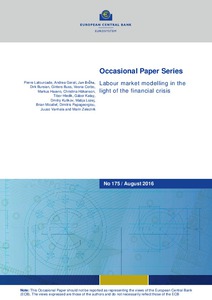Labour market modelling in the light of the financial crisis
"This paper examines the overall macroeconomic impact arising from reform in government wages and employment, at times of fiscal consolidation. Reform of these two components of the government wage bill appeared necessary for containing the deterioration of the public finances in several EU cou...
| Main Authors: | , , , , , , , , , , , , , , , |
|---|---|
| Institution: | ETUI-European Trade Union Institute |
| Format: | TEXT |
| Language: | English |
| Published: |
Frankfurt am Main
2016
ECB |
| Subjects: | |
| Online Access: | https://www.labourline.org/KENTIKA-19102914124919201969-Labour-market-modelling-in-the.htm |
| _version_ | 1771659900647112706 |
|---|---|
| author | Lafourcade, Pierre Gerali, Andrea Bruha, Jan Bursian, Dirk Buss, Ginters Corbo, Vesna Haavio, Markus Hakanson, Christina Hlédik, Tibor Katay, Gabor Kulikov, Dmitry Lozei, Matiia Micallef, Brian Papageorgiou, Dimitris Vanhala, Juuso Zeleznik, Marin |
| author_facet | Lafourcade, Pierre Gerali, Andrea Bruha, Jan Bursian, Dirk Buss, Ginters Corbo, Vesna Haavio, Markus Hakanson, Christina Hlédik, Tibor Katay, Gabor Kulikov, Dmitry Lozei, Matiia Micallef, Brian Papageorgiou, Dimitris Vanhala, Juuso Zeleznik, Marin |
| collection | Library items |
| description | "This paper examines the overall macroeconomic impact arising from reform in government wages and employment, at times of fiscal consolidation. Reform of these two components of the government wage bill appeared necessary for containing the deterioration of the public finances in several EU countries, as a consequence of the financial crisis. Such reforms entailed in some instances, but not always, the implementation of cost-cutting measures affecting the government wage bill, as part of broader consolidation packages that typically hinged more heavily on other fiscal instruments, like public investment. While such measures have adverse short-term macroeconomic effects, public wage bill restraining policy changes present the idiosyncrasy that they can yield medium- to longer-term benefits due to possible competitiveness and efficiency gains through their impact on labour market dynamics. This paper provides some evidence of such medium- to long-run effects, based on a wealth of micro and macro data in the euro area and the EU. It concludes that appropriately designed government wage bill moderation could indeed produce positive dividends to the economy, which depend on certain country-specific conditions. These gains can be reinforced by relevant fiscal-structural reforms." |
| format | TEXT |
| geographic | EU countries |
| id | 19102914124919201969_f778d41a6522411aa8f4c826ac66225b |
| institution | ETUI-European Trade Union Institute |
| is_hierarchy_id | 19102914124919201969_f778d41a6522411aa8f4c826ac66225b |
| is_hierarchy_title | Labour market modelling in the light of the financial crisis |
| language | English |
| physical | 67 p. Digital |
| publishDate | 2016 |
| publisher | Frankfurt am Main ECB |
| spellingShingle | Lafourcade, Pierre Gerali, Andrea Bruha, Jan Bursian, Dirk Buss, Ginters Corbo, Vesna Haavio, Markus Hakanson, Christina Hlédik, Tibor Katay, Gabor Kulikov, Dmitry Lozei, Matiia Micallef, Brian Papageorgiou, Dimitris Vanhala, Juuso Zeleznik, Marin economic recession labour market macroeconomics unemployment Labour market modelling in the light of the financial crisis |
| thumbnail | https://www.labourline.org/Image_prev.jpg?Archive=106269192444 |
| title | Labour market modelling in the light of the financial crisis |
| topic | economic recession labour market macroeconomics unemployment |
| url | https://www.labourline.org/KENTIKA-19102914124919201969-Labour-market-modelling-in-the.htm |

